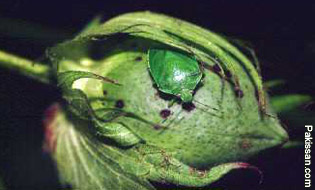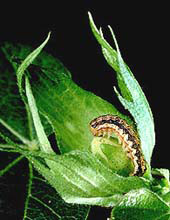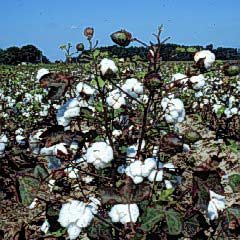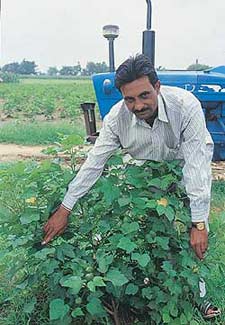|
Advisory /
BIOTECHNOLOG
Home Biotechnology
White Lie about the Bt Cotton
Ijaz Ahmad Rao - Bahawalpur
Bt cotton, the first transgenic non-food crop is designed to
protect crops from pests and cut spraying costs. It contains a
strand of genetic material from the naturally occurring soil
micro-organism Bacillus thuringiensis (Bt), and it has been
successfully grown since 1996 in USA, Australia, China, India
and many other countries.
 Before
the arrival of Bt technology; cotton farmers around the globe
had the only option of chemical pesticides as weapon to combat
the major chewing pests like Bollworm known as “Sundi”. It is
a fact that Bt provides essentially 100% control of most of
sundies in cotton crops; while supplemental foliar insecticide
sprays are occasionally required to keep away other sucking
pests like Jassid, white fly so on from causing excessive
damage in Bt fields. It is worth knowing that no Bt cotton
seed developer has ever claimed that it would also control
sucking pests. Therefore it is wrong to accuse the Bt Cotton
that its illegal cultivation of non-approved varieties in
Sindh is not providing protection against Jassid and leaf curl
virus (CLCV) disease; which is causing huge damages in cotton
fields. Before
the arrival of Bt technology; cotton farmers around the globe
had the only option of chemical pesticides as weapon to combat
the major chewing pests like Bollworm known as “Sundi”. It is
a fact that Bt provides essentially 100% control of most of
sundies in cotton crops; while supplemental foliar insecticide
sprays are occasionally required to keep away other sucking
pests like Jassid, white fly so on from causing excessive
damage in Bt fields. It is worth knowing that no Bt cotton
seed developer has ever claimed that it would also control
sucking pests. Therefore it is wrong to accuse the Bt Cotton
that its illegal cultivation of non-approved varieties in
Sindh is not providing protection against Jassid and leaf curl
virus (CLCV) disease; which is causing huge damages in cotton
fields.
Currently a systematic strong propaganda is being carried out
by many scare-mongers in different medias; who want to create
phobia and ambiguity in public mind by misleading information
about Bt seeds technology; it is a fact that during the past
few years, the average number of bollworm treatments applied
to Bt fields in Australia, India, China, USA has ranged from
0.27 to 1.22 treatments per field, which is considerably lower
than the 5 to 16 sprays per field that were applied to control
bollworm/tobacco budworm on non-Bt fields. Despite strong
resistance of many movements against Bt technology, no one can
deny the ground reality about the success and growth of Bt
technology around the world.
 Another
big white lie is that milk and poultry products derived from
animals consuming feed derived from GM crops may invite
serious health hazards in humans. Perhaps the most telling
fact about the safety of plant biotechnology is that there
isn’t a single documented case of an illness caused by foods
developed with biotechnology since they first came on the
market in the mid-1990s. While a report by European countries
validating the safety of biotech crops, summarized more than
15 years of research by 400 research teams funded by European
governments. In this report from the European Commission,
whose member states are more skeptical about biotech products,
concluded that “the use of more precise technology and the
greater regulatory scrutiny (over biotech foods) probably make
them even safer than conventional plants and foods”. Today
more than 3.6 billions people around the world are taking
directly or indirectly genetically modified (GM) food. It is
worth knowing that there is no GMO or Bt in refine edible oil
from any Bt crops; and Bt crops are as safe as non Bt if not
safer, that’s why in May 2004, EU has lifted its five year ban
on GM food. Another
big white lie is that milk and poultry products derived from
animals consuming feed derived from GM crops may invite
serious health hazards in humans. Perhaps the most telling
fact about the safety of plant biotechnology is that there
isn’t a single documented case of an illness caused by foods
developed with biotechnology since they first came on the
market in the mid-1990s. While a report by European countries
validating the safety of biotech crops, summarized more than
15 years of research by 400 research teams funded by European
governments. In this report from the European Commission,
whose member states are more skeptical about biotech products,
concluded that “the use of more precise technology and the
greater regulatory scrutiny (over biotech foods) probably make
them even safer than conventional plants and foods”. Today
more than 3.6 billions people around the world are taking
directly or indirectly genetically modified (GM) food. It is
worth knowing that there is no GMO or Bt in refine edible oil
from any Bt crops; and Bt crops are as safe as non Bt if not
safer, that’s why in May 2004, EU has lifted its five year ban
on GM food.
It is notable that in March 2004, UK (today, regarded as
sensitive to agriculture biotechnology in Europe) has also
approved the commercial planting of GM Crop in England. The
farm tests in UK showed that GM crops could be more beneficial
to wildlife when compared with a conventional crop sprayed
with the powerful chemical while the economic review said
there were few short-term benefits for the UK in pursuing the
technology but there could be longer-term benefits for farmers
and consumers from crops that were better suited to the
British climate and which had boosted nutrients. The science
review said the risks to human health from GM were very low.
Similarly nowadays trials of genetically modified crops are
underway throughout Germany.
There is no doubt that cotton crop in number of districts in
Sindh and South Punjab has been attacked by deadly virus - the
cotton leaf curl virus (CLCV); but you cannot blame it on the
Bt technology; varieties susceptible to CLCV will be infected
regardless of other traits (‘e.g.’ Bacillus thuringiensis
(Bt)) incorporated - Quality conscious companies bound by
regulatory procedures will always ensure selection of
varieties resistant to CLCV or other diseases for trait
incorporating. Biosafety Guidelines once approved will also
govern the approval process starting from regulatory trials to
determine the performance and safety of products derived
through genetic engineering. Any activity on their part that
contravenes the laws of the land and in most cases their
strict business ethics will erode their reputation and
credibility. On the other hand unscrupulous elements currently
involved in the trade of unauthentic Bt Cotton seeds without
having to fear their reputation or laws of the land are only
worried about unlawful gains on the cost of poor farmers.
Neither quality is their priority nor do they have capacity to
ensure it.
It is worth knowing here that under the Seed Act 1976 and
Plant Quarantine Rules 1967; no one is allowed to cultivate
any imported Bt, conventional or hybrid cotton seeds or plants
with out the approval, therefore its cultivation is a criminal
act. So it is an obligation for those who have information
about such an activity in their region to report to the
concerned government agencies immediately, rather than keep
mum about it and waiting for any drama or catastrophe to take
place, and later blame it on others.
This mafia is exploiting the demand for such technology
amongst farmers despite so much of anti-biotech propaganda by
the antis. This is a clear indication of the farmers
confidence in the technology therefore government of Pakistan
need to understand the farmers aspirations and should give
approval of Biosafety guidelines at the earliest, otherwise
the technology will get a bad name due to its pirated version
being illegally presented by the unscrupulous traders.
According to The Times of India (2 July, 04) "The cultivation
of BT cotton is expected to increase 10 times this year with
more farmers preferring the Bt varieties. BT cotton not only
increases the yield but also avoids use of pesticides. It is
popular because of providing results within 45 to 90 days
compared to cultivation from normal seeds which take around
120 days. There are farmers preferring BT cotton to increase
the yield. Out of 17 lakh hectares, BT cotton is used in
nearly one lakh acre.” Similarly according to The Hindu
Business Line (June 2004) “This year higher cotton crop size
is largely due to increased sowing of Bt cotton seeds”.
 This
is a fact that the performance of Bt Cotton is dependent on
agro climatic conditions, genotype of the hybrids and
management of crop. In some areas, the certain Bt varieties
may be inappropriate for local growing conditions and may fail
to produce satisfactory yields. For example under high night
temperatures and under hot dry conditions, bolls may drop off
the plants; some farmers in India reported that bolls set
erratically or in irregular patterns. That’s why approved
varieties of Bt cotton after been tested in different
agro-climatic conditions must be cultivated. Refrain from
sowing “non approved” It is important to know that so far most
attempts of introducing non approved Bt cotton have failed to
deliver desired results, the main reason behind this is the
selection of wrong variety of cotton seeds which may be not
fit under local environments. This
is a fact that the performance of Bt Cotton is dependent on
agro climatic conditions, genotype of the hybrids and
management of crop. In some areas, the certain Bt varieties
may be inappropriate for local growing conditions and may fail
to produce satisfactory yields. For example under high night
temperatures and under hot dry conditions, bolls may drop off
the plants; some farmers in India reported that bolls set
erratically or in irregular patterns. That’s why approved
varieties of Bt cotton after been tested in different
agro-climatic conditions must be cultivated. Refrain from
sowing “non approved” It is important to know that so far most
attempts of introducing non approved Bt cotton have failed to
deliver desired results, the main reason behind this is the
selection of wrong variety of cotton seeds which may be not
fit under local environments.
Even as the patrons of biotechnology - industry and academia
included, are trying their best to convince the general public
about the benefits of the Bt technology; but some are
attempting to drive home the threats of an alien invasion into
agriculture. However a risk/benefit approach to biotechnology
is preferable. If the risks of Bt cotton can be managed and
the benefits are significant, farmers should be able use this
crop. Although there is a considerable amount of research
under investigation globally using gene technology and
biotechnology in agriculture and health; so scientists must
communicate to the masses in the language that a common man
can understand, the benefits of the Biotechnology and Genetic
Engineering in the area of agriculture and health. Regulatory
policies need to get more transparent if apprehensions about
Bt cotton crop or GMO’s.
 In
short Biotech products are being used for human consumption
all over the world. Most industrialized countries and many
developing countries have native biotechnology crop research
and development programs like NIBGE in Pakistan. There are
currently no globally accepted biotech standards or guidelines
for evaluation of the safety of biotech products. Therefore,
in the absence of broadly accepted standards, most of the
countries have adopted their own safety regulations and
standards with respect to biotech products. Whereas
development of Bio-safety standards and procedures by many
countries have helped its traders, growers and manufacturers;
and prevented foreign firms from entering its markets
unlawfully. In
short Biotech products are being used for human consumption
all over the world. Most industrialized countries and many
developing countries have native biotechnology crop research
and development programs like NIBGE in Pakistan. There are
currently no globally accepted biotech standards or guidelines
for evaluation of the safety of biotech products. Therefore,
in the absence of broadly accepted standards, most of the
countries have adopted their own safety regulations and
standards with respect to biotech products. Whereas
development of Bio-safety standards and procedures by many
countries have helped its traders, growers and manufacturers;
and prevented foreign firms from entering its markets
unlawfully.
Hence, rather than blaming government institutes and
undermining Bt crops technology, it is vital that we must
understand the promises made by this emerging technology and
need to show enlightened moderate behaviors by evaluating case
by case in other parts of the world as well rather than
concluding that all diseases in cotton crops are due to Bt,
however it is fact that increasing use of Bt Cotton around the
world substantiates that it has more advantages than
disadvantages..
Contact:
|
Pakissan.com;
|